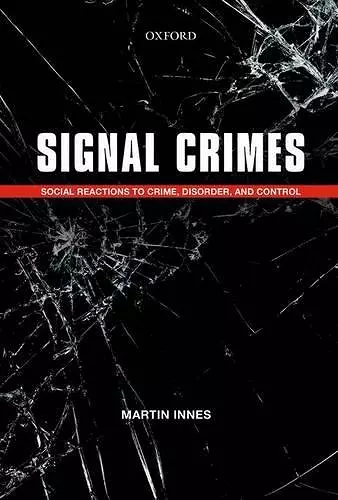Signal Crimes
Social Reactions to Crime, Disorder, and Control
Format:Paperback
Publisher:Oxford University Press
Published:12th Jun '14
Currently unavailable, and unfortunately no date known when it will be back
This paperback is available in another edition too:
- Hardback£76.00(9780199684465)

How do individuals, communities, and institutions react to crime, disorder, and social control events? How do such incidents shape the contours of social order and the make-up of society? Why do some crimes and disorders matter more than others in influencing how we think, feel, and act about our security? These are the questions that lie at the heart of Signal Crimes: Social Reactions to Crime, Disorder, and Control. Signal Crimes: Social Reactions to Crime, Disorder, and Signal Crimes brings together the key insights and findings from a ten-year programme of fieldwork investigating the concept of a 'signal crime': an incident that changes how people think, feel and behave about their safety due to it functioning as a signal of the presence of wider risks and threats. Presenting ground-breaking new perspectives on social reactions to crime, Signal Crimes innovatively and rigorously examines how and why particular events trigger certain forms of reaction, and how these unfold and develop across social space and time. This includes detailed studies of: how fear travels within and across communities in the aftermath of criminal homicides; the ways rumours impact upon what we think about the prevalence and distribution of crime; the extent to which some individuals and neighbourhoods are vulnerable to being harmed more by disorder than others; how the conduct of counter-terrorism has been altered in recent years by the institutional effects of a number of signal events; and the ways in which social control interventions are used to communicate messages to public audiences. Through examination of these diverse issues and using a range of both historical and contemporary sources, the author reveals how our individual and collective responses to problematic behaviour are organised. If a perspective constitutes a way of seeing, then the signal crimes perspective provides a new set of optics for how we see the impacts of crime, disorder, and control. Showcasing the development of this new concept, Signal Crimes argues for a radical and challenging understanding of how we think not only about the crime, but also about the ways in which we perceive and react to such problematic and troubling acts.
One of the most eagerly anticipated criminological publications, Martin Innes' Signal Crimes makes a persuasive case for rethinking much of our approach to crime and social order. In an extraordinarily wide-ranging set of essays he focuses our attention on the ways in which order and disorder are perceived, understood and communicated, and the implications of this for the ways in which formal and informal social control work. This is one book that will surely stand the test of time. * Professor Tim Newburn, London School of Economics and Political Science *
It is difficult to capture just how important this work is. In recent years, Martin Innes has pioneered an innovative research programme which creatively and rigorously explores the many ramifications of the simple but profound truth that 'some incidents matter more than others in shaping public sentiments about crime, disorder and control'. Signal Crimes brings together Innes' work in this field, covering substantive topics as varied as terrorism, murder and low-level urban disorder, as well as penetrating observations on methodology. It is a vital text. * Professor Sir Anthony Bottoms, University of Cambridge *
Professor Innes has developed a seminal body of work, supported by mounting evidence from others concerning how people read and rate crime and disorder in their environment. This thinking was pivotal in the trials that re-invented neighbourhood policing in England and Wales. * Sir Denis O'Connor, formerly Her Majesty's Chief Inspector of Constabulary, 2008-2012 *
Nothing short of a new framework for understanding the social meaning of crime and criminal justice. * Professor Jonathan Simon, University of California, Berkeley *
ISBN: 9780199684472
Dimensions: 234mm x 166mm x 13mm
Weight: 346g
214 pages